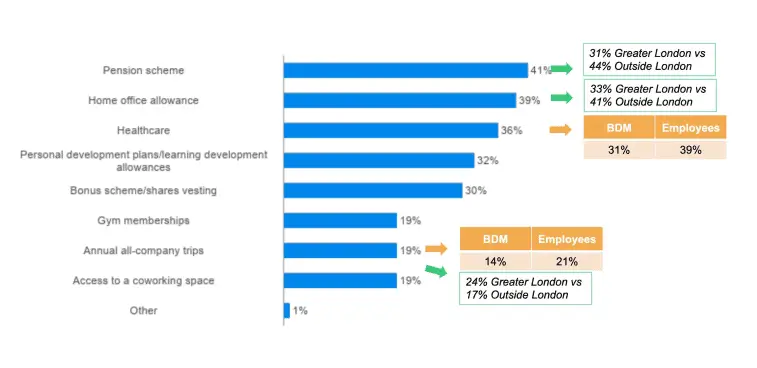Finding the right fit for your team isn’t easy, regardless of whether you are a remote or co-located company. While hiring globally allows for an infinitely bigger talent pool to choose from, it also presents more challenges. The pandemic has only increased the number of companies transitioning to remote, making the competition all the more fierce. Instead of trying to convince candidates to choose you over other local companies, you’ll need to stand out amongst the hundreds of thousands of remote companies vying for their attention.
So, how do you go about attracting the best global talent? Better still, how do you keep them happy in their role? We believe it’s through being confident in your company culture and offering great employee benefits.
Here are a few suggestions for benefits you can offer, but keep in mind that you have to be open to feedback and find what works best for your team.
1. Understand your company culture and use it to steer your hiring decisions
Before you can begin to build your dream team, you need to understand exactly what your company stands for and what kind of culture you want to cultivate. A fail-safe way to do this is to establish your company values. Once you have a clear idea of your company culture in your mind, you can start thinking about the type of employee that will help bring this vision to life or help maintain it.
Over the years, it’s become apparent that remote teams tend to favor personality over qualifications and experience. That’s because company culture is so important when it comes to working with a distributed team. On the Building Remotely podcast on why remote companies should hire globally, Tony Jamous from Oyster commented:
podcast on why remote companies should hire globally, Tony Jamous from Oyster commented:
“Company culture trumps country-specific culture. You are creating a strong company culture that is more important than the fact that your employees are from Hong Kong or South Africa or Greece.”
Sit down and make a list of all the qualities and soft skills that you’re looking for in your employees, regardless of their position. For example:
- Self-motivated
- Collaborative
- Creative
- Tech-savvy
- Accountability
- Self-management
- Emotional intelligence
You can then build on this list with hard skills for each new role until you’ve built your perfect employee on paper. Sending out a clear message to potential employees means you’ll have a better chance of retaining them once they’ve joined your team.
2. Write an inspiring job advert
The average person reads through hundreds, if not thousands, of job descriptions on their way to finding the right job. Try to be a bit different by making your job description interactive or including a quick video with testimonials from current employees or an overview of what the job looks like day-to-day. Adding an honest and descriptive mission statement will make the right candidate for the job think “those are the values and mission I want to be a part of.”
The interview process is much easier to handle when both parties have an understanding of what they’ll be working towards together.
Offer great benefits to your employees
Other than company culture and enjoying their job on a day-to-day basis, employees will be looking at the benefits offered to them. This goes beyond just a competitive salary to things like health insurance, training opportunities, and a home office stipend.

3. Start with essential benefits
In a recent study by Remote.com, health insurance was one of the top benefits that employees looked for in a new job, and when you’re a company that operates locally, that’s usually a given. So how do you offer health insurance to a distributed team, where one employee is working in the Philippines, another in the USA, and another in Spain? Until recently, this was an impossible problem for companies to overcome – there were no systems built for distributed teams, and employers had to purchase a different health insurance plan in each country – a timely, not to mention expensive endeavour. It also doesn’t allow you to treat all employees equally – if you’re giving your entire team stipends to spend on this, the employee based in Europe will have a better plan than the employee based in the US.
looked for in a new job, and when you’re a company that operates locally, that’s usually a given. So how do you offer health insurance to a distributed team, where one employee is working in the Philippines, another in the USA, and another in Spain? Until recently, this was an impossible problem for companies to overcome – there were no systems built for distributed teams, and employers had to purchase a different health insurance plan in each country – a timely, not to mention expensive endeavour. It also doesn’t allow you to treat all employees equally – if you’re giving your entire team stipends to spend on this, the employee based in Europe will have a better plan than the employee based in the US.
Luckily for us, since the remote working environment has boomed, new products and services have been designed to overcome such challenges. You can tailor the benefits you offer to what your team needs the most, starting with health related benefits such as:
- Health insurance

- Mental health support
- Gym memberships
- Spa and yoga retreats.
4. Encourage a healthy work-life balance
Much of the appeal of working remotely is the work-life balance that comes with it. The majority of remote companies give their employees a lot of flexibility when it comes to working hours. While async teams can work whenever and wherever they’d like to, the ones operating synchronously usually allocate a three or four-hour window each day for core working hours. This allows for team overlap and for any important meetings to take place.
By adopting the ‘we don’t mind when you work, as long as you get the work done’ approach, you’re establishing mutual trust between the company and its employees while also building up a sense of accountability. Offering employees the opportunity for their job to work around their lifestyle, rather than their life to revolve around work, often leads to a better work-life balance and, in the end, happier employees.
5. Give all new employees a home-office budget
When you work in a traditional office space, everything is set up for you; you’ll have your high-tech computer, ergonomic chair, extra monitor, and access to a super speedy internet connection. On the other hand, remote workers are often left to their own devices when it comes to setting up a suitable office space. Some of the best remote companies out there offer new employees a one-off budget to use to set up a home office space. While this may seem like quite a big investment, it’s worthwhile to keep employees as productive as possible and to make sure they feel valued above all else.
Another option is to provide a monthly budget to join a co-working space. With the rise of remote working, co-working spaces have popped up in destinations worldwide that allow remote workers to either hire a permanent desk space or hot-desk for a one-off fee. Not all new recruits will need this, so it’s always worth chatting with them to see what kind of space will enable them to be their most productive selves.
6. Offer opportunities for personal and professional development
Many remote employees are ambitious, self-motivated individuals that want to thrive and acquire new knowledge in any company that they join. Encouraging and offering support for your employees to join courses, hire a coach, attend conferences and seminars will also benefit the company.
Some companies choose to give employees a yearly budget to spend on training courses while some might simply make it clear that employees can approach them with any training opportunities they think they could benefit from.
7. Organize online or in-person team gatherings
Remote employees often struggle with loneliness. Going beyond the usual virtual coffee or lunch breaks, having at least one team gathering a year where the entire team decides on a location and spends a week together is a fantastic benefit to offer.
This has been an impossible task to accomplish during the pandemic, and it’s likely that many remote workers won’t feel comfortable traveling for a while. In the meantime, try to organize a team gathering online. Instead of relying on different team building games, we suggest organizing something that will give your team a purpose, an end goal, and ideally a prize at the end. Hackathons are a great way to engage the entire team and build something fun together that usually wouldn’t have a high enough priority on your product roadmap.
are a great way to engage the entire team and build something fun together that usually wouldn’t have a high enough priority on your product roadmap.
One final word of advice for hiring the best global talent
8. Keep on top of the latest trends
With this new global remote workforce in full swing and internet access at an all-time high, the world of remote has changed drastically in the last two decades. And there’s no sign of it slowing down. As the pioneers of the remote age continue to build remote-forward products, we’ll see even more companies jumping on the bandwagon and hiring the best global talent is only going to get more competitive. Remote companies need to be leading the way with innovative solutions and benefits by staying on top of trends and learning from each other. Check out what the best remote companies to work for are offering to their teams
and learning from each other. Check out what the best remote companies to work for are offering to their teams .
.
To wrap up
Hiring global talent isn’t just about the interview process but about what you’re offering as an employee beyond a salary. It may all be well and good, promising these fantastic perks and a booming company culture, but if you can’t deliver what you promise, you’ll end up losing the top-tier employees that you’ve spent so much time and effort hiring. By understanding your company culture and offering genuine perks to potential employees, you can hire the best global talent and make sure they stick around for the long term.

